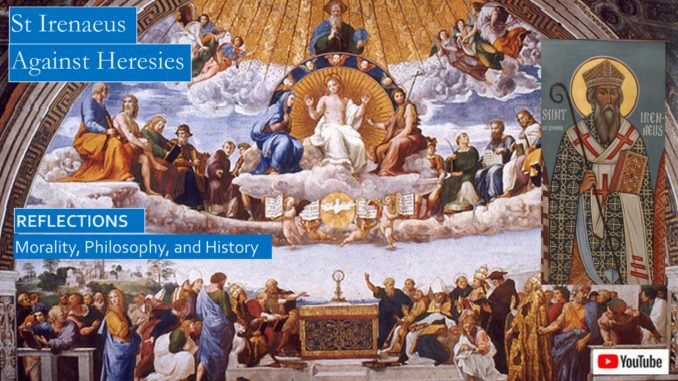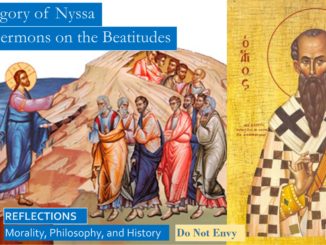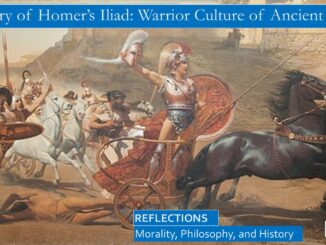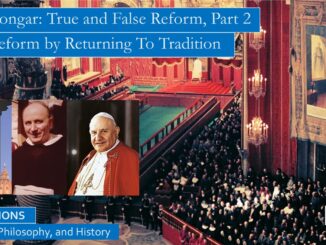
When we examine what the scholars say about St Irenaeus, we must begin with the ancient church historian Eusebius who lived during the reign of Emperor Constantine the Great. Eusebius quotes St Irenaeus in many places when discussing the heresies faced by the Church, how the Church should rely on the faith as handed down by the bishops. St Irenaeus himself has a connection to the Apostles, when he was a young man, he met the elderly bishop Polycarp. Eusebius quotes Irenaeus, “I remember how Polycarp spoke of his friendship with St John the Apostle and with the others who had seen the Lord; how he repeated their words from memory, and how the things that he had heard them say about the Lord, His miracles and His teaching, things that he had heard direct from the eyewitnesses of the Word of Life, were proclaimed by Polycarp in complete harmony with Scripture.”[1]
Pope Francis has announced that St. Irenaeus of Lyon will soon be declared a Doctor of the Church with the title “Doctor Unitatis,” meaning doctor of unity. Pope Francis addressed the members of the St. Irenaeus Orthodox-Catholic Joint Working Group: “I will willingly declare your patron a Doctor of the Church,” as St Irenaeus is “a great spiritual and theological bridge between Eastern and Western Christians.” “His name, Irenaeus, contains the word ‘peace,” the Pope stressed, recalling its Greek root Ειρηναίος (Eirenaios), which means ‘peaceful,’ ‘peacemaker,’ and ‘seraphic’.[2]
The best place to purchase the eBook version of the Ante-Nicene Fathers, Volume 1, is http://www.christianbook.com
YouTube video for this blog: https://youtu.be/bG1okLOum2E
YouTube script with book links: https://www.slideshare.net/BruceStrom1/st-irenaeus-on-heresies-early-church-father-future-doctor-of-the-church
Like most Church Fathers, we are missing many details of his life. Irenaeus was likely born in Syria and grew up in Smyrna in Asia Minor. When and where he was ordained into the priesthood is unclear. Sometime in his midlife he relocated to Gaul where he was a missionary, preaching to them in their native tongue. He became a bishop in what is today Lyon, France, living until his seventies. Although there was no concept of East and West during the time of the Apostolic Fathers, we can now look back and say that, along with St John Cassian, he was a bridge between East and West.[3]
Eusebius explains, “Irenaeus, whose name means ‘peaceable’ and who by temperament was a peacemaker, pleased and negotiated for the peace of the churches.” There was a dispute between Bishop Viktor of Rome and the Asian dioceses over the length of a church fast, he was threatening excommunication over this dispute. Irenaeus interceded, arguing that “the dispute is not only about the day, but also about the actual character of the fast.” He pointed out the variations were differences in practice extending back to their forefathers. Although they had their differences, “they all lived in peace with one another, and so do we: the divergences in the fast emphasizes the unanimity of the faith.”[4]
Henry Chadwick states that “Irenaeus’ scheme does not begin with the Gnostic question: How a world which is the perfect work of a perfect creator can have gone wrong as the present world obviously has. He grants from the start there is imperfection in the world, but it is like the blunders of a growing child, and the purpose of our existence is the making of character by the mastery of difficulties and temptations.”
Irenaeus accepted the canonicity of the Four Gospels; Chadwick says that Irenaeus believed it “was essential to keep the path laid down by authority in scripture and in the clear tradition of the apostolic churches which was the guarantee of resistance to innovation and dangerous speculation. Heresy was born of the itch for something new.”[5]
Irenaeus clarified the ancient Christian doctrine of recapitulation on how Christ saved mankind. The scholar Jaroslav Pelikan, with quotes from Irenaeus, says that “for Irenaeus, the imitation of Christ by the Christian was part of God’s cosmic plan of salvation which began with Christ’s imitation of the Christian or, more precisely, with Christ’s imitation of Adam. The Logos ‘assimilated Himself to man and man to Himself’ in His life and in His passion. After Christ’s incarnation He passed through every stage of human growth, hallowing and redeeming each by ‘being made for them an example of piety, righteousness, and submission.’ The disobedience of the first Adam was undone through the complete obedience of the second Adam, so that many could be justified and attain salvation.” “Christ became the example for men, as Adam had been the example for Christ; being the Logos of God, Christ was not only the example, but the exemplar and prototype of the image of God according to which man had been created.”[6]
This doctrine of recapitulation is also expressed in the Catholic Catechism:
CCC 518 Christ’s whole life is a mystery of recapitulation. All Jesus did, said and suffered had for its aim restoring fallen man to his original vocation, quoting from Irenaeus:
When Christ became incarnate and was made man, he recapitulated in himself the long history of mankind and procured for us a “short cut” to salvation, so that what we had lost in Adam, that is, being in the image and likeness of God, we might recover in Christ Jesus. For this reason, Christ experienced all the stages of life, thereby giving communion with God to all men.[7]
The Orthodox scholar John McGuckin points out that Irenaeus lived during a time of sporadic intense persecution. Once his ruling bishop was martyred while he travelled on church business. As McGuckin states, Irenaeus “returned to find a congregation devastated b fatal persecution, which explains his conservative call for obedience and liturgical discipline,” he simply “wants to protect and build up again what has been traumatized.
McGuckin notes that Irenaeus is not like today’s armchair academicians who wish to repeat the Gnostic teachings with absolute accuracy;” instead, he wishes to expose the Gnostic “pessimistic attitude toward material being and a desire to transcend it in a Platonizing manner.
These two blogs include many interesting quotes from his books, On Heresies, and from Balthasar’s anthology mostly drawn from this work as well:
St Irenaeus Blog 1 Against Heresies, Introduction
http://www.seekingvirtueandwisdom.com/st-irenaeus-blog-1-against-heresies-introduction/
St Irenaeus Blog 2 Against Heresies
http://www.seekingvirtueandwisdom.com/st-irenaeus-blog-2-against-heresies/
ST IRENAEUS AND SCRIPTURAL ALLEGORIES
St Irenaeus was not the first Church Father to see Christ foreshadowed in the Old Testament by means of allegory, Christians were reading the Bible stories from the time of St Paul in Galatians:
“Abraham had two sons, one by a slave woman and the other by a free woman. One, the child of the slave, was born according to the flesh; the other, the child of the free woman, was born through the promise. Now this is an allegory: these women are two covenants. One woman, in fact, is Hagar, from Mount Sinai, bearing children for slavery.” “But the other woman corresponds to the Jerusalem above; she is free, and she is our mother.”
“What does the scripture say? ‘Drive out the slave and her child; for the child of the slave will not share the inheritance with the child of the free woman.’ So then, friends, we are children, not of the slave but of the free woman.”[8]
In a passage in Luke, Jesus specifically exhorted us to search for Him in the stories of the Old Testament.
Some days after His crucifixion, Jesus appeared in cognito to some of His disciples on the road to Emmaus, but they did not immediately recognize Him. Appearing as fellow traveller, he walked with them, engaging in conversation with them when they expressed dismay at the crucifixion of Jesus, their Lord, for they were not yet aware of His Resurrection.
“Then Jesus said to them, ‘Oh, how foolish you are, and how slow of heart to believe all that the prophets have declared! Was it not necessary that the Messiah should suffer these things and then enter into his glory?’ Then beginning with Moses and all the prophets, he interpreted to them the things about himself in all the scriptures.”[9]
This blog relates many allegories by St Irenaeus in On Heresies:
St Irenaeus Blog 3 Allegorical Interpretations of Scripture
http://www.seekingvirtueandwisdom.com/st-irenaeus-blog-3-allegorical-interpretations-of-scripture/
MORE QUOTES FROM ST IRENAEUS IN CATHOLIC CATECHISM
We have more quotes from the Catholic Catechism, these are the most interesting. The highlighted sections are quoted from St Irenaeus.
Several sections on ONLY ONE FAITH quote St Irenaeus:
ONLY ONE FAITH
CCC 172 Through the centuries, in so many languages, cultures, peoples and nations, the Church has constantly confessed this one faith, received from the one Lord, transmitted by one Baptism, and grounded in the conviction that all people have only one God and Father. St. Irenaeus of Lyons, a witness of this faith, declared:
CCC 173 “Indeed, the Church, though scattered throughout the whole world, even to the ends of the earth, having received the faith from the apostles and their disciples. . . guards [this preaching and faith] with care, as dwelling in but a single house, and similarly believes as if having but one soul and a single heart, and preaches, teaches and hands on this faith with a unanimous voice, as if possessing only one mouth.”[10]
CCC 294 The glory of God consists in the realization of this manifestation and communication of his goodness, for which the world was created. God made us “to be his sons through Jesus Christ, according to the purpose of his will, to the praise of his glorious grace”, for “the glory of God is man fully alive; moreover man’s life is the vision of God: if God’s revelation through creation has already obtained life for all the beings that dwell on earth, how much more will the Word’s manifestation of the Father obtain life for those who see God.”[11]
Many of the quotes are from the section in the Catechism on the Creed:
CCC 460 Creed: Conceived by the Holy Spirit, born of the Virgin Mary
The Word became flesh to make us “partakers of the divine nature”: “For this is why the Word became man, and the Son of God became the Son of man: so that man, by entering into communion with the Word and thus receiving divine sonship, might become a son of God.” “For the Son of God became man so that we might become God.” “The only-begotten Son of God, wanting to make us sharers in his divinity, assumed our nature, so that he, made man, might make men gods.”[12]
Likewise, St Irenaeus teaches us that “the knot of Eve’s disobedience was loosed by the obedience of Mary. For what the virgin Eve has bound fast through unbelief, this did the virgin Mary set free through faith.”
CCC 494 Creed, Born of Virgin Mary
As St. Irenaeus says, “Being obedient she became the cause of salvation for herself and for the whole human race.” Hence not a few of the early Fathers gladly assert. . .: “The knot of Eve’s disobedience was untied by Mary’s obedience: what the virgin Eve bound through her disbelief; Mary loosened by her faith.” Comparing her with Eve, they call Mary “the Mother of the living” and frequently claim: “Death through Eve, life through Mary.”[13]
CCC 797 The Holy Spirit makes the Church “the temple of the living God”: St Irenaeus:
Indeed, it is to the Church herself that the “Gift of God” has been entrusted…. In it is in her that communion with Christ has been deposited, that is to say: the Holy Spirit, the pledge of incorruptibility, the strengthening of our faith and the ladder of our ascent to God…. For where the Church is, there also is God’s Spirit; where God’s Spirit is, there is the Church and every grace.[14]
CCC 1000 Our participation in the Eucharist already gives us a foretaste of Christ’s transfiguration of our bodies: Irenaeus:
Just as bread that comes from the earth, after God’s blessing has been invoked upon it, is no longer ordinary bread, but Eucharist, formed of two things, the one earthly and the other heavenly: so too our bodies, which partake of the Eucharist, are no longer corruptible, but possess the hope of resurrection.[15]
CCC 1722 Beatitudes
“Blessed are the pure in heart, for they shall see God.“
Irenaeus: It is true, because of the greatness and inexpressible glory of God, that “man shall not see me and live,” for the Father cannot be grasped. But because of God’s love and goodness toward us, and because he can do all things, he goes so far as to grant those who love him the privilege of seeing him…. For “what is impossible for men is possible for God.”[16]
Decalogue
CCC 2063 Ending with quote from Irenaeus:
The Lord prescribed love towards God and taught justice towards neighbor, so that man would be neither unjust, nor unworthy of God. Thus, through the Decalogue, God prepared man to become his friend and to live in harmony with his neighbor…. the words of the Decalogue remain likewise for us Christians. Far from being abolished, they have received amplification and development from the fact of the coming of the Lord in the flesh.[17]
[1] Eusebius, The History of the Church, translated by GA Williamson (New York: Dorset Press, 1984, 1965, originally written 300’s AD), Book 5, Chapter 20, pp. 227-228.
[2] https://www.vaticannews.va/en/pope/news/2021-10/st-irenaeus-doctor-of-the-church-pope-francis.html
[3] Edgar Goodspeed, revised and enlarged by Robert Grant, “A History of Early Christian Literature” (Chicago: University of Chicago Press, 1942, 1966), p. 119, and Irenaeus, “Irenaeus Against Heresies,” in the Nicene and Post-Nicene Fathers, First Series, Volume 1 (Boston: Hendrickson Publishers, 1994, first published 1885), Introduction, pp. 309-312
[4] Eusebius, The History of the Church, Book 5, Chapter 24, pp. 232-233.
[5] Henry Chadwick, The Early Church (New York: Dorset Press, 1967), pp. 80-82.
[6] Jaroslav Pelikan, The Emergence of the Catholic Tradition, Volume 1 of The Christian Tradition, History of the Development of Doctrine (Chicago: University of Chicago Press, 1971), pp. 144-145.
[7] https://www.vatican.va/archive/ENG0015/__P1L.HTM
[8] https://www.biblegateway.com/passage/?search=galatians+4%3A21-28&version=NRSVCE
[9] https://www.biblegateway.com/passage/?search=Luke+24%3A25-27&version=NRSVCE
[10] https://www.vatican.va/archive/ENG0015/__P11.HTM
[11] https://www.vatican.va/archive/ENG0015/__P19.HTM
[12] https://www.vatican.va/archive/ENG0015/__P1J.HTM
[13] https://www.vatican.va/archive/ENG0015/__P1K.HTM
[14] https://www.vatican.va/archive/ENG0015/__P28.HTM
[15] https://www.vatican.va/archive/ENG0015/__P2H.HTM




5 Trackbacks / Pingbacks